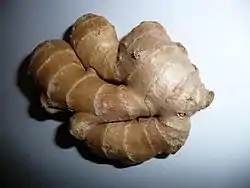< Reconstruction:Proto-Sino-Tibetan

Reconstruction:Proto-Sino-Tibetan/kjaŋ
Proto-Sino-Tibetan
Etymology
- Proto-Sino-Tibetan: ?
- Proto-Tibeto-Burman: *kyaŋ (Matisoff, STEDT)
There is perhaps a codaless variant, which may be an allofam or a product from the confusion with other species of Zingiberaceae (e.g. galangal); compare Tibetan སྒ (sga) (whence སྒེའུ (sge'u), སྒ་སྐྱ (sga skya)) ~ ལྒ (lga) ~ རྒ (rga) ("ginger"), Japanese 生姜 (shōga, “ginger”), Proto-Bahnaric *kjaː₁ (“ginger”), Thai ข่า (kha, “galangal”), Lao ຂ່າ (khā, “galangal”).
It is unknown how this relates to
- Proto-Vietic *s-gəːŋ ~ s-kəːŋ (“ginger”)
- > Vietnamese gừng / gầng
- Proto-Hmongic *qʰinᴮ ("ginger")
- Proto-Mienic *kʰjuŋᴬ ("ginger") (possibly a Chinese loan)
- Proto-Tai *χiːŋᴬ (“ginger”)
- Proto-Hlai *kʰɯːŋ (“ginger”)
- Proto-Kam-Sui *kaŋ (“ginger”) (possibly a Chinese loan)
- Lakkia ɦiŋ² (“ginger”)
- Khmer ខ្ញី (kɲəj, “ginger”).
- Proto-Dravidian *cinki (“ginger”)
- > Tamil இஞ்சி (iñci), Sanskrit शृङ्गवेर (śṛṅgavera), Ancient Greek ζιγγίβερῐς (zingíberis), English ginger

[1] Ginger, root of Zingiber officinale.
Descendants
- Old Chinese: 䕬 /*kaŋ/ (B-S; ZS) ("ginger")
- Lolo-Burmese-Naxi
- Lolo-Burmese
- Burmish
- Written Burmese: ချင်း (hkyang:, “ginger”)
- Burmish
- Lolo-Burmese
- Proto-Bodo-Garo: *hai²-ciŋ
- Bodo (India): हायजें (hayzeŋ)
- Dimasa: hajing
- Rabha: চিংকু (ciŋ-kú)
- Proto-Kuki-Chin: *thiŋ
- Northern
- Zou: sing
- Northern
This article is issued from Wiktionary. The text is licensed under Creative Commons - Attribution - Sharealike. Additional terms may apply for the media files.